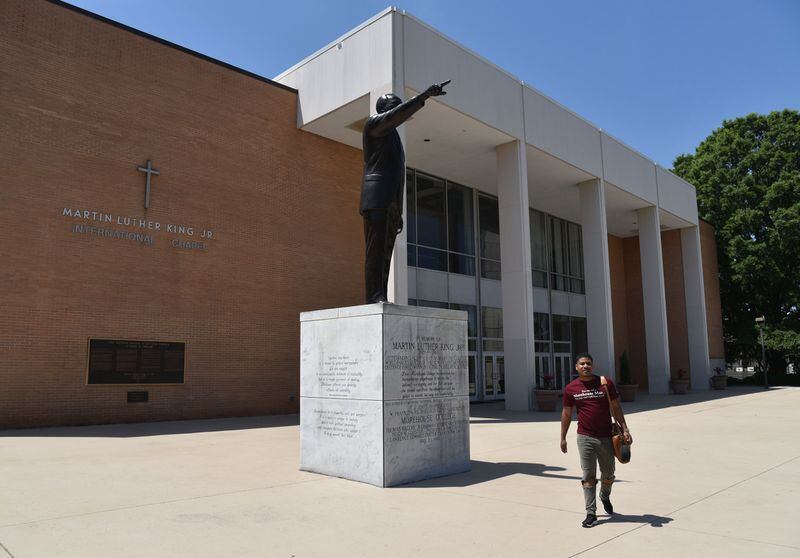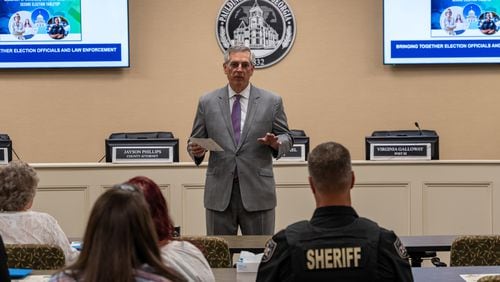Second chances were invented for kids like Keith Glass. Third, fourth, and fifth chances too.
Glass started high school at South Atlanta with ambitions of being a rapper. He invested in a set of gold grills. As for college, “All I heard was that it was an option and you didn’t have to go,” he said.
If he showed up for class, he was more inclined to crack jokes and entertain his classmates than take notes. His grades were so bad he was assigned to summer school every year.
This weekend, Glass will graduate from Morehouse College. This summer, he expects to start work as a teacher, his transformation testimony to a young man’s ability to reinvent himself — and to the power of teachers to change lives.
The youngest of his mother’s three children, Glass could always count on his charm to get him through. As a toddler, he could persuade his grandma’s girlfriends to carry him when he didn’t want to walk. Glass’s biological father was an occasional phone call, maybe a visit now and then. But as a teenager, he could talk his stepfather into buying him a cellphone or other teenage necessity first, before his siblings.
By the time he reached high school, if it wasn’t something he wanted to do — and there wasn’t much he wanted to do at school besides flirt with girls, shoot dice and play basketball — he wouldn’t do it.
The first week of high school, he assaulted a teacher, pushing her up against a wall and running his hands over her body, he said. He thought it might make his friends laugh. It could have gotten him expelled. But instead, administrators at two of the academies that made up what is now South Atlanta High School came to an agreement: Glass could transfer to a different academy at South Atlanta.
“I believed that students deserve a second chance,” said Peter McKnight, the former principal of South Atlanta School of Law and Social Justice. Keith “was able to impress upon us that he realized what he had done was wrong and we would not have any issues moving forward.”
In his sophomore year, Glass punched a girl in a school bus fight.
“I never got the sense from Keith that Keith was malicious or his intent was particularly malicious,” McKnight said. “He struck me as having difficulty with impulse control and managing his emotions. I thought we could work with him on that.”
By junior year, his high school plan was just to get out the door to graduation, even if it meant a GED program.
Then one fall weekend in Glass’s senior year, South Atlanta teacher Warren Chancellor, a Morehouse graduate, put Glass and his other students on a bus and took them to his alma mater for the day, culminating with the school’s annual welcoming ceremony for incoming freshmen.
Glass had never seen black men like this before — in slim-cut suits and shined shoes, celebrating learning, cheering each other on, with ambitions beyond Atlanta.
“I was exposed to something that I’d never seen before,” Glass recalled. “I was like, how do I get back to that lifestyle?”
All he wanted was to go to Morehouse.
Chancellor brought him back to earth: Three years of running the halls hadn’t given him the grades to get into Morehouse or the skills to succeed there. But he told Glass: “If you’re serious about Morehouse, take this application, fill it out. Before you submit it, let’s talk.”
They started talking every day. Encouraged by a straight-A girlfriend who promised she’d drop him if he didn’t graduate, Glass started showing up for class most of the time. Kevin Reeves, a Clark Atlanta University student who became his mentor, kept calling him, texting him, checking up on him, taking him on trips to Boston, New York and Mississippi; introducing him to Clark Atlanta students; showing him life beyond Lakewood. McKnight, his high school principal, pulled him out of class and hugged him the day he finally passed the last state test he needed to graduate.
The straight-A girlfriend, Crishana Echols, saw a difference. “Once people started changing his environment he started seeing things that he wanted to be a part of,” she said.
But at home, his life was crumbling. His stepfather died. His mother, who had worked two jobs for decades to support him and his siblings, was hospitalized. They lost their home. Glass moved in with his grandmother, sleeping on the couch.
The rejection letter from Morehouse that spring crushed him. Glass graduated from high school near the very bottom of his class, then went back home to his grandmother’s couch.
Glass found a second-chance program at Georgia Perimeter College. He enrolled in remedial classes, working full time at the Fulton County courthouse downtown during the day and riding the bus to the college’s Dunwoody campus most evenings.
Credit: Hyosub Shin
Credit: Hyosub Shin
Glass transferred to Morehouse with a 3.5 GPA at age 22 with a full scholarship. He earned a spot on the dean’s list. He started wearing the same tailored suits and leather loafers he’d once ragged Chancellor for wearing. His old friends, many of them high school dropouts, many of them fathers, some in jail, started calling him and asking for advice: “Keith, how do I get what you got?”
Once at Morehouse, Glass found a new goal — to become a teacher and motivational speaker so he can help young people who were like him.
“There are a lot of students that went through a lot of the same things I went through, but did not have the same opportunities and support systems that I had,” he said. “I just want to give back.”
Chancellor, his former teacher, was part of a national program called Teach for America, which places college graduates with little formal education training in high-needs schools like South Atlanta. He started taking Glass to talk to Teach for America participants. Glass refined his story of redemption, his rise from the very bottom of his high school class. The participants, graduates from some of the country’s top colleges, gave him standing ovations. They crowded around him afterward to talk.
Glass spoke to high school classes and assemblies. He was the opening speaker at a Teach for America event featuring John Legend.
“People have been just offering things to me,” he told Chancellor. “People have been wanting me to succeed.”
This summer he expects to enroll in Teach for America or another teacher-preparation program and become a teacher himself. He hopes to teach math, the subject Chancellor taught at South Atlanta.
Earlier in his time at Morehouse, he went back to South Atlanta to address that year’s senior class. He told them about his mistakes, his struggles, the lessons he’d learned.
People had tears in their eyes. “It was one of the best motivational speeches I’ve ever heard,” said McKnight, the former South Atlanta principal who gave Keith a few of his second chances.
Keith’s charisma was always clear, McKnight said. But a few years ago, his life trajectory wasn’t.
“He could have gone either way,” McKnight said.











